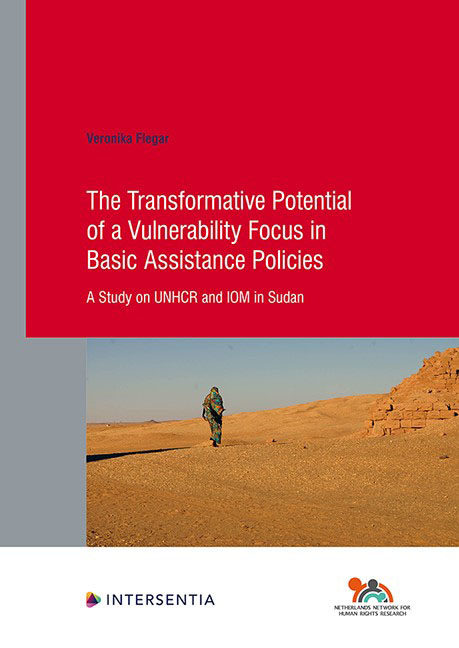 The Transformative Potential of a Vulnerability Focus in Basic Assistance Policies
The Transformative Potential of a Vulnerability Focus in Basic Assistance Policies Published online by Cambridge University Press: 11 November 2021
This chapter presents the case study’s findings regarding the implementation of the vulnerability assessments for basic assistance at IOM’s Migrant Resource and Response Centre (MRRC) in Khartoum. The chapter follows the same structure as the previous chapter: it first elaborates upon the vulnerability assessments themselves (12.1), then presents the administrative dilemmas which appear relevant to the implementation of these assessments (12.2) and subsequently outlines the contextual constraints perceived as relevant by respondents involved in the implementation of the vulnerability assessments (12.3). The chapter ends with a short summary in the form of concluding remarks (12.4).
The findings presented in each section largely rely on semi-structured interviews with the four case workers that were directly involved in the implementation of the vulnerability screening or of the vulnerability prioritisation tool. This includes all case workers working with the assessments at IOM’s MRRC in Khartoum at the time of my field research. If the interview transcripts contained gaps on relevant information I had come across during my participant observation, I integrated this information through field note references. I attempted to present as much raw data as possible without making the text unreadable. Where quotes were relevant to several themes and/or concepts I merely used the quote once (usually where I found it to be most relevant) and subsequently referred to it in a footnote in other sections where the quote could equally have served to illustrate a certain point.
The personal and professional characteristics of the respondents did not appear to be particularly relevant for the findings presented below. Two case workers were male and two were female. All respondents were either Sudanese or from another East African country. The gender or nationality of the respondents did not appear to play any significant role for their interaction with me or for their replies to my interview questions.
THE IMPLEMENTATION OF THE VULNERABILITY ASSESSMENTS
This section concentrates on the implementation of the vulnerability assessments for basic assistance at IOM’s MRRC in Khartoum. It outlines the implementation of the outreach and selection process for the identification of eligible beneficiaries (12.1.1) and the case workers’ interpretations of and experiences with the main eligibility and vulnerability criteria (12.1.2).
To save this book to your Kindle, first ensure [email protected] is added to your Approved Personal Document E-mail List under your Personal Document Settings on the Manage Your Content and Devices page of your Amazon account. Then enter the ‘name’ part of your Kindle email address below. Find out more about saving to your Kindle.
Note you can select to save to either the @free.kindle.com or @kindle.com variations. ‘@free.kindle.com’ emails are free but can only be saved to your device when it is connected to wi-fi. ‘@kindle.com’ emails can be delivered even when you are not connected to wi-fi, but note that service fees apply.
Find out more about the Kindle Personal Document Service.
To save content items to your account, please confirm that you agree to abide by our usage policies. If this is the first time you use this feature, you will be asked to authorise Cambridge Core to connect with your account. Find out more about saving content to Dropbox.
To save content items to your account, please confirm that you agree to abide by our usage policies. If this is the first time you use this feature, you will be asked to authorise Cambridge Core to connect with your account. Find out more about saving content to Google Drive.